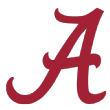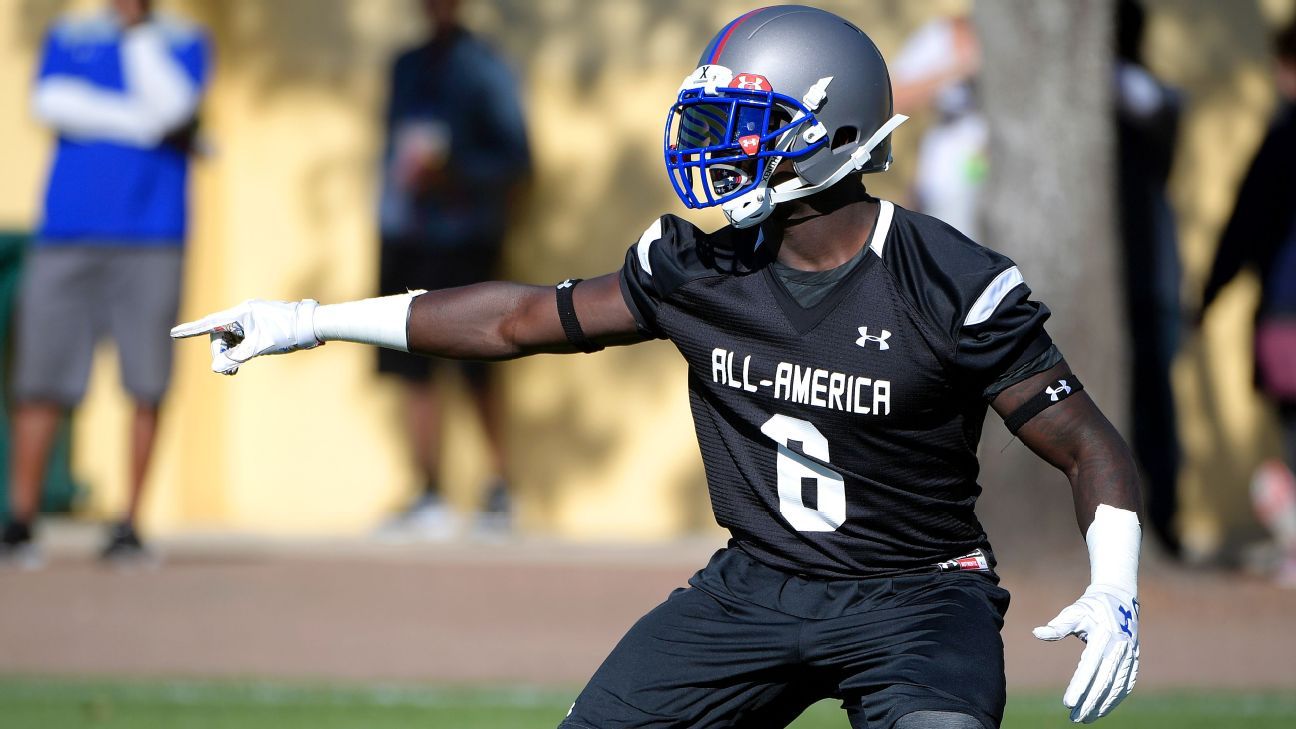Alabama and Notre Dame will play in the Rose Bowl Game Presented by Capital One on Friday at 4 p.m. ET on ESPN and the ESPN App.
The Crimson Tide have won two national championships in the College Football Playoff era and have made the playoff six of the past seven years, including this season. Notre Dame’s only previous playoff game was in 2018, when the Irish lost 30-3 to Clemson.
Both teams have taken very different paths to reaching this point: a win from the national championship game.
Here is a look at how Alabama and Notre Dame have built their teams through recruiting.

Alabama Crimson Tide
ESPN 300 recruits
Of the four playoff teams this season, Alabama has signed the most ESPN 300 recruits from 2016 to 2020 with 92. Ohio State is next with 73, followed by Clemson (60) and Notre Dame (47).
The Crimson Tide have actually signed more top-100 recruits in that timespan — 49 — than Notre Dame has ESPN 300 recruits. Diving even further into those numbers, Alabama signed 31 top-50 recruits, nine ranked as five-stars.
Part of a team’s success is keeping that talent in the program, and of the nine five-stars, only Eyabi Anoma has transferred. Dylan Moses, Alex Leatherwood, Najee Harris, Patrick Surtain II and Evan Neal are all big contributors. Quarterback Bryce Young and defensive end Chris Braswell were just signed in the 2020 class, and offensive lineman Pierce Quick is still a redshirt freshman, so there’s a chance Alabama gets production out of all of the remaining eight five-stars on the roster.
That is not always the case, especially with transfers happening more and more often and the influx of talent Alabama is bringing in. The steady flow of top prospects makes for a competitive environment.
Class rankings
It shouldn’t be a surprise to learn Alabama has not signed a class lower than No. 6 in the rankings over the past five cycles. In fact, the program has signed the No. 1 class twice (2017 and 2019), the No. 2 class in 2016, the No. 3 class in 2020 and the No. 6 class 2018.
The program has an average class ranking of 2.6 from 2016 to 2020. It’s easy to think that Alabama should be winning at the highest level because of all the talent coming in, which is partially true. But Nick Saban should get some credit for managing the locker room with that much talent and maintaining a roster that typically does not have many problems with roster turnover or holes left by unexpected departures.
Consistent quarterback play
This Alabama team is laden with veterans who are performing at a high level. Of the 22 starters on offense and defense, 13 are either juniors or seniors.
That leadership starts at quarterback with Mac Jones, who has thrown for 3,739 yards, 32 touchdowns and four interceptions while completing 76.45% of his passes. He was named a Heisman Trophy finalist and has been the leader on offense for the Crimson Tide.
Jones was a four-star prospect in high school ranked outside the ESPN 300 and was actually the second quarterback the staff took in the 2017 class. The other quarterback was a guy named Tua Tagovailoa. Then-offensive coordinator Lane Kiffin said the staff knew it wanted to take two quarterbacks in the class and originally had Jake Fromm committed until he flipped to Georgia.
Jones had other offers out of high school and at one point was even committed to Kentucky, but continued to reel in other offers after he committed, including one from Alabama. He decommitted from the Wildcats and flipped to the Crimson Tide after that offer came in.
He committed after Tagovailoa, the top-ranked dual-threat quarterback in the 2017 class, committed. Outside of Jones, the staff has former ESPN 300 recruit Paul Tyson, who was part of the 2019 class, and Young, who was the No. 1 dual-threat quarterback and the No. 5-ranked recruit overall in the past recruiting cycle.
Many thought Young would come in and win the starting job right away, but Jones proved that his time waiting to get his chance was worth it.
Stat leaders
Jones has been excellent in the passing game for this team. He has had a lot of help thanks to a strong offensive line. He has two five-star tackles in Leatherwood and Neal blocking for him, and every one of the linemen in the two-deep were ranked in the ESPN 300 out of high school. After center Landon Dickerson went down with an injury in the SEC championship game, Alabama plugged in senior Chris Owens, who was the No. 76-ranked recruit overall in the 2016 class.
That kind of depth is a luxury few teams have and is a big reason why Alabama is consistently in the playoff picture.
Jones has the luxury of handing the ball off to a former five-star prospect in Najee Harris, who has 1,262 yards and 24 total touchdowns. In fact, all three of Alabama’s leaders in rush yards were former ESPN 300 prospects, including Jase McClellan, whom Alabama flipped from Oklahoma in the 2020 class.
Jones has a Heisman finalist at wide receiver in DeVonta Smith, who was an ESPN 300 recruit in the 2017 class, and also has former ESPN 300 star Jaylen Waddle, who has dealt with injuries this season. This position group is unlike other groups for Alabama, though, as four of the top seven in receiving yards on the team were not ranked in the top 300.
John Metchie III, a four-star prospect, is second on the team in receiving yards, while Slade Bolden and Miller Forristall were both three-stars.
As the offense has quite a few veterans and upperclassmen contributing, half of the main contributors on defense are either freshmen or sophomores.
That includes true freshmen Malachi Moore, Will Anderson Jr. and Brian Branch. Moore leads the team in interceptions (three) and Branch is tied for second on the team (two). Anderson leads the team in sacks (seven), and both he and Moore are among the leaders in total tackles as well.
Moore and Anderson’s emergence shows how well the staff can fill any holes with prospects who are ready to contribute immediately.
2017 class contributors
The 2017 class is a great example of what Alabama has been able to do with its recruiting classes, pulling out talent from the top prospects and maximizing production. Of the 26 prospects signed in that class, 15 are either currently among the stat leaders on this team or have already gone off to the NFL — namely Jerry Jeudy, Jedrick Wills Jr., Tagovailoa, Xavier McKinney, Isaiah Buggs and Henry Ruggs III.
But with this current team, the staff also have Leatherwood, Smith, Moses, Harris, Jones, Phidarian Mathis, Daniel Wright, Christopher Allen and Brian Robinson Jr. from the 2017 class. That nucleus of fourth-year players is integral to Alabama’s hopes for what would be the class’ second national championship.

Notre Dame Fighting Irish
ESPN 300 recruits
Notre Dame has had the fewest ESPN 300 recruits over the past five cycles of the four playoff teams. With 47 of the top-300 prospects, Notre Dame is bucking the trend of teams leading the way in landing top prospects making the playoff.
The Irish have only signed 10 top-100 prospects over the past five recruiting cycles, compared to 49 for Alabama, 34 for Ohio State and 30 for Clemson. That they have found their way back to the playoff for a second time under Brian Kelly without many elite-level recruits is impressive.
Compared to Alabama’s nine five-star signees, Notre Dame hasn’t had any in the same span, but has built a stout defense and used its strength along the offensive line to move its offense forward.
Of the 47 ESPN 300 recruits Notre Dame signed, 12 were along the offensive line, which shows the success they’ve had at recruiting the position group and the emphasis up front to ensure great line play throughout the past few years.
Among the current starters along the offensive line, Liam Eichenberg, Aaron Banks, Tommy Kraemer and Robert Hainsey were all ESPN 300 recruits out of high school.
Class rankings
The Irish are also the lowest of all the playoff teams in average class ranking over the past five cycles. Alabama averaged a ranking of 2.6, Ohio State had an average ranking of 6.0 and Clemson not far behind at 6.8.
Notre Dame has averaged a class ranking of 13.8 from 2016 to 2020, with its highest-ranked class coming in 2018 at No. 9 overall. The staff has had two classes ranked 16th and two at No. 14.
No team has won the national championship in the playoff era without landing at least one top-five recruiting class in the four years prior to winning, and every winner has averaged better than a top-10 class ranking for those four years. The question becomes if Notre Dame can break that stat and become the first, or if the talent acquired over the past five recruiting cycles by Alabama will be too much and eliminate Notre Dame from contention.
Veteran leadership
An area on which Notre Dame will rely against Alabama is its upperclassmen. The program’s leadership and experience from its veteran players are a big reason for its success.
Notre Dame has 12 players among the leaders in stats on offense and defense that are in their fourth year or more within the program. Shaun Crawford, a starting safety who was an ESPN 300 recruit in the Class of 2015, had a waiver for his sixth year of eligibility approved after a career riddled with injuries.
Of the 12 players, six are fifth-year seniors as well, including quarterback Ian Book, wide receivers Javon McKinley and Ben Skowronek and defenders Daelin Hayes, Nick McCloud and Adetokunbo Ogundeji.
Developing players in college has become increasingly more difficult with an increased number of underclassmen entering the NFL draft and the increasing number of players transferring. When a team can keep the number of players for five years that Notre Dame has this season, the developmental aspect and the decision-making that come with experience has the ability to shine through.
Stat leaders
Book has stood out among those veteran players and has led Notre Dame this season in passing with 2,601 yards, 15 touchdowns and two interceptions. As a three-star out of high school, Book had been more of a game manager prior to this season but continued to win.
He has been excellent in Notre Dame’s bigger games this season, completing 22 of 39 passes for 310 yards and one touchdown against Clemson in the regular season win and completing 20 of 28 passes for 210 yards in the ACC championship loss to the Tigers.
Interestingly for Notre Dame, none of its leaders in passing, rushing or receiving yardage this season were ranked in the ESPN 300. Running back Kyren Williams was a four-star, but outside the top 300, and wide receiver McKinley was a three-star in the 2016 class.
It’s similar on defense as well, as the leader in sacks, Ogundeji, was a three-star and the leader in tackles, Jeremiah Owusu-Koramoah, was a four-star.
That’s not to say that the whole roster is made up of players who were ranked outside the ESPN 300 in high school, though, because there are some important pieces who were very highly sought-after as recruits.
Safety Kyle Hamilton, the team’s second-leading tackler and interception leader, was ranked No. 165 overall in the 2019 class and has been a big piece of the Irish defense. Defensive linemen Isaiah Foskey and Daelin Hayes, both ESPN 300 recruits, are second and third on the team in sacks, respectively.
Overall, seven of the top nine tacklers this season were ranked outside the ESPN 300; four of the seven players with an interception on the team weren’t in the ESPN 300; three of the top five in receiving yards were not in the top 300 and three of the team’s four leading rushers were also not in the ESPN 300 out of high school.
Notre Dame’s team makeup is not the norm for past playoff teams, but the Irish have made it this far and have a chance to change the pattern on who can win and who has won it all.
